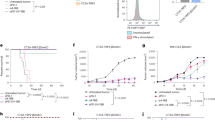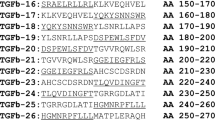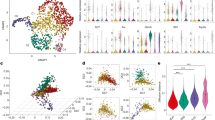Abstract
Natural killer (NK) cells may modulate the development of adaptive immune responses, but until now there has been little evidence to support this hypothesis. We investigated the primary and secondary immunity elicited by various tumor cell lines that express CD70 and interact with CD70 ligand (CD27), which is constitutively expressed on NK cells. CD70 expression enhanced primary tumor rejection in vivo as well as T cell immunity against secondary tumor challenge. Primary rejection of major histocompatibility complex (MHC) class I–deficient RMA-S.CD70 tumor cells was mediated by NK cells and perforin- and interferon-γ–dependent mechanisms. This NK cell–mediated process also efficiently evoked the subsequent development of tumor-specific cytotoxic and T helper type 1 responses to the parental, MHC class I–sufficient, RMA tumor cells. Thus CD27-CD70 interactions provide a key link between innate NK cell responses and adaptive T cell immunity.
This is a preview of subscription content, access via your institution
Access options
Subscribe to this journal
Receive 12 print issues and online access
$209.00 per year
only $17.42 per issue
Buy this article
- Purchase on Springer Link
- Instant access to full article PDF
Prices may be subject to local taxes which are calculated during checkout








Similar content being viewed by others
References
Trinchieri, G. Biology of natural killer cells. Adv. Immunol. 47, 187–376 (1989).
Whiteside, T. L. & Herberman, R. B. Role of human natural killer cells in health and disease. Clin. Diagn. Lab. Immunol. 1, 125–133 (1994).
Diefenbach, A., Jamieson, A. M., Liu, S. D., Shastri, N. & Raulet, D. H. Ligands for the murine NKG2D receptor: expression by tumor cells and activation of NK cells and macrophages. Nature Immunol. 1, 119–126 (2000).
Cerwenka, A. et al. Retinoic acid early inducible genes define a ligand family for the activating NKG2D receptor in mice. Immunity 12, 721–727 (2000).
Moretta, A. et al. Activating receptors and coreceptors involved in human natural killer cell-mediated cytolysis. Annu. Rev. Immunol. 19, 197–223 (2001).
Brown, M. G. et al. Vital involvement of a natural killer cell activation receptor in resistance to viral infection. Science 292, 934–937 (2001).
Lanier, L. L. NK cell receptors. Annu. Rev. Immunol. 16, 359–393 (1998).
Nandi, D., Gross, J. A. & Allison, J. P. CD28-mediated costimulation is necessary for optimal proliferation of murine NK cells. J. Immunol. 152, 3361–3369 (1994).
Azuma, M., Cayabyab, M., Buck, D., Phillips, J. H. & Lanier, L. L. Involvement of CD28 in MHC-unrestricted cytotoxicity mediated by a human natural killer leukemia cell line. J. Immunol. 149, 1115–1123 (1992).
Geldhof, A. B., Moser, M. & De Baetselier, P. IL-12-activated NK cells recognize B7 costimulatory molecules on tumor cells and autologous dendritic cells. Adv. Exp. Med. Biol. 451, 203–210 (1998).
Geldhof, A. B. et al. Expression of B7–1 by highly metastatic mouse T lymphomas induces optimal natural killer cell-mediated cytotoxicity. Cancer Res. 55, 2730–2733 (1995).
Chambers, B. J., Salcedo, M. & Ljunggren, H. G. Triggering of natural killer cells by the costimulatory molecule CD80 (B7-1). Immunity 5, 311–317 (1996).
Wilson, J. L. et al. NK cell triggering by the human costimulatory molecules CD80 and CD86. J. Immunol. 163, 4207–4212 (1999).
Kos, F. J. & Engleman, E. G. Immune regulation: a critical link between NK cells and CTLs. Immunol. Today 17, 174–176 (1996).
Kos, F. J. Regulation of adaptive immunity by natural killer cells. Immunol. Res. 17, 303–312 (1998).
Takeda, K. et al. CD27-mediated activation of murine NK cells. J. Immunol. 164, 1741–1745 (2000).
Lens, S. M., Tesselaar, K., van Oers, M. H. & van Lier, R. A. Control of lymphocyte function through CD27–CD70 interactions. Semin. Immunol. 10, 491–499 (1998).
Hintzen, R. Q., de Jong, R., Lens, S. M. & van Lier, R. A. CD27: marker and mediator of T-cell activation? Immunol. Today 15, 307–311 (1994).
Gravestein, L. A., Nieland, J. D., Kruisbeek, A. M. & Borst, J. Novel mAbs reveal potent co-stimulatory activity of murine CD27. Int. Immunol. 7, 551–557 (1995).
Herbst, H., Raff, T. & Stein, H. Phenotypic modulation of Hodgkin and Reed-Sternberg cells by Epstein- Barr virus. J. Pathol. 179, 54–59 (1996).
Wolthers, K. C. et al. Increased expression of CD80, CD86 and CD70 on T cells from HIV- infected individuals upon activation in vitro: regulation by CD4+ T cells. Eur. J. Immunol. 26, 1700–1706 (1996).
Hendriks, J. et al. CD27 is required for generation and long-term maintenance of T cell immunity. Nature Immunol. 1, 433–440 (2000).
Ljunggren, H. G. & Karre, K. Host resistance directed selectively against H-2-deficient lymphoma variants. Analysis of the mechanism. J. Exp. Med. 162, 1745–1759 (1985).
Smyth, M. J., Kelly, J. M., Baxter, A. G., Korner, H. & Sedgwick, J. D. An essential role for tumor necrosis factor in natural killer cell- mediated tumor rejection in the peritoneum. J. Exp. Med. 188, 1611–1619 (1998).
Smyth, M. J. et al. Differential tumor surveillance by natural killer (NK) and NKT cells. J. Exp. Med. 191, 661–668 (2000).
Karre, K., Ljunggren, H. G., Piontek, G. & Kiessling, R. Selective rejection of H-2-deficient lymphoma variants suggests alternative immune defence strategy. Nature 319, 675–678 (1986).
Lorenz, M. G., Kantor, J. A., Schlom, J. & Hodge, J. W. Anti-tumor immunity elicited by a recombinant vaccinia virus expressing CD70 (CD27L). Hum. Gene Ther. 10, 1095–1103 (1999).
van den Broek, M. F., Kagi, D., Zinkernagel, R. M. & Hengartner, H. Perforin dependence of natural killer cell-mediated tumor control in vivo. Eur. J. Immunol. 25, 3514–3516 (1995).
Sijts, A. J. et al. Identification of an H-2 Kb-presented Moloney murine leukemia virus cytotoxic T-lymphocyte epitope that displays enhanced recognition in H- 2 Db mutant bm13 mice. J. Virol. 68, 6038–6046 (1994).
Stukart, M. J. et al. A crucial role of the H-2 D locus in the regulation of both the D- and the K-associated cytotoxic T lymphocyte response against Moloney leukemia virus, demonstrated with two Db mutants. J. Immunol. 128, 1360–1364 (1982).
Chen, W., Qin, H., Chesebro, B. & Cheever, M. A. Identification of a gag-encoded cytotoxic T-lymphocyte epitope from FBL- 3 leukemia shared by Friend, Moloney, and Rauscher murine leukemia virus-induced tumors. J. Virol. 70, 7773–7782 (1996).
Ossendorp, F., Mengede, E., Camps, M., Filius, R. & Melief, C. J. Specific T helper cell requirement for optimal induction of cytotoxic T lymphocytes against major histocompatibility complex class II negative tumors. J. Exp. Med. 187, 693–702 (1998).
van Hall, T. et al. Identification of a novel tumor-specific CTL epitope presented by RMA, EL-4, and MBL-2 lymphomas reveals their common origin. J. Immunol. 165, 869–877 (2000).
Wolpert, E. Z. et al. Generation of CD8+ T cells specific for transporter associated with antigen processing deficient cells. Proc. Natl Acad. Sci. USA 94, 11496–11501 (1997).
Kos, F. J. & Engleman, E. G. Requirement for natural killer cells in the induction of cytotoxic T cells. J. Immunol. 155, 578–584 (1995).
Kurosawa, S. et al. Early-appearing tumour-infiltrating natural killer cells play a crucial role in the generation of anti-tumour T lymphocytes. Immunology 85, 338–346 (1995).
Suzuki, R., Suzuki, S., Ebina, N. & Kumagai, K. Suppression of alloimmune cytotoxic T lymphocyte (CTL) generation by depletion of NK cells and restoration by interferon and/or interleukin 2. J. Immunol. 134, 2139–2148 (1985).
Burlington, D. B., Djeu, J. Y., Wells, M. A., Kiley, S. C. & Quinnan, G. V. Jr Large granular lymphocytes provide an accessory function in the in vitro development of influenza A virus-specific cytotoxic T cells. J. Immunol. 132, 3154–3158 (1984).
Stitz, L., Baenziger, J., Pircher, H., Hengartner, H. & Zinkernagel, R. M. Effect of rabbit anti-asialo GM1 treatment in vivo or with anti-asialo GM1 plus complement in vitro on cytotoxic T cell activities. J. Immunol. 136, 4674–4680 (1986).
Smyth, M. J. & Kelly, J. M. Accessory function for NK1.1+ natural killer cells producing interferon-γ in xenospecific cytotoxic T lymphocyte differentiation. Transplantation 68, 840–843 (1999).
Shi, F. D. et al. Natural killer cells determine the outcome of B cell-mediated autoimmunity. Nature Immunol. 1, 245–251 (2000).
Ryan, J. C., Turck, J., Niemi, E. C., Yokoyama, W. M. & Seaman, W. E. Molecular cloning of the NK1.1 antigen, a member of the NKR-P1 family of natural killer cell activation molecules. J. Immunol. 149, 1631–1635 (1992).
Diefenbach, A., Jensen, E. R., Jamieson, A. M. & Raulet, D. H. Rae1 and H60 ligands of the NKG2D receptor stimulate tumour immunity. Nature 413, 165–171 (2001).
Cerwenka, A., Baron, J. L. & Lanier, L. L. Ectopic expression of retinoic acid early inducible-1 gene (RAE-1) permits natural killer cell-mediated rejection of a MHC class I-bearing tumor in vivo. Proc. Natl Acad. Sci. USA 98, 11521–11526 (2001).
Wilson, J. L. et al. Targeting of human dendritic cells by autologous NK cells. J. Immunol. 163, 6365–6370 (1999).
Sugita, K. et al. Participation of the CD27 antigen in the regulation of IL-2-activated human natural killer cells. J. Immunol. 149, 1199–1203 (1992).
McCoy, J. L., Fefer, A. & Glynn, J. P. Influence of infectious virus on the induction of transplantation resistance in the Friend tumor system. Cancer Res. 27, 2267–2271 (1967).
Klein, G., Klein, E. & Haughton, G. Variation of antigenic characteristics between different mouse lymphomas induced by the Moloney virus. J. Natl Cancer Inst. 36, 607–621 (1966).
Zhou, F., Rouse, B. T. & Huang, L. Prolonged survival of thymoma-bearing mice after vaccination with a soluble protein antigen entrapped in liposomes: a model study. Cancer Res. 52, 6287–6291 (1992).
Smyth, M. J., Taniguchi, M. & Street, S. E. The anti-tumor activity of IL-12: mechanisms of innate immunity that are model and dose dependent. J. Immunol. 165, 2665–2670 (2000).
Smyth, M. J. et al. Perforin is a major contributor to NK cell control of tumor metastasis. J. Immunol. 162, 6658–6662 (1999).
Johnstone, R. W. et al. P-glycoprotein does not protect cells against cytolysis induced by pore- forming proteins. J. Biol. Chem. 276, 16667–16673 (2001).
Hammond, K. J. et al. NKT cells are phenotypically and functionally diverse. Eur. J. Immunol. 29, 3768–3781 (1999).
Arase, H., Arase, N. & Saito, T. Interferon-γ production by natural killer (NK) cells and NK1.1+ T cells upon NKR-P1 cross-linking. J. Exp. Med. 183, 2391–2396 (1996).
Smyth, M. J. & Sedgwick, J. D. Delayed kinetics of tumor necrosis factor-mediated bystander lysis by peptide-specific CD8+ cytotoxic T lymphocytes. Eur. J. Immunol. 28, 4162–4169 (1998).
Smyth, M. J., Crowe, N. Y. & Godfrey, D. I. NK cells and NKT cells collaborate in host protection from methylcholanthrene-induced fibrosarcoma. Int. Immunol. 13, 459–463 (2001).
Acknowledgements
We thank C. Hall and the staff of the PMCI for their maintenance and care of the mice in this project. Supported by Human Frontier Science Program and National Health and Medical Research Council of Australia (M. J. S.) and Diabetes Australia (D. I. G.).
Author information
Authors and Affiliations
Corresponding author
Rights and permissions
About this article
Cite this article
Kelly, J., Darcy, P., Markby, J. et al. Induction of tumor-specific T cell memory by NK cell–mediated tumor rejection. Nat Immunol 3, 83–90 (2002). https://doi.org/10.1038/ni746
Received:
Accepted:
Published:
Issue Date:
DOI: https://doi.org/10.1038/ni746
This article is cited by
-
Novel TLR 7/8 agonists for improving NK cell mediated antibody-dependent cellular cytotoxicity (ADCC)
Scientific Reports (2021)
-
Anti-CD321 antibody immunotherapy protects liver against ischemia and reperfusion-induced injury
Scientific Reports (2021)
-
Induction of NKG2D ligand expression on tumor cells by CD8+ T-cell engagement-mediated activation of nuclear factor-kappa B and p300/CBP-associated factor
Oncogene (2019)
-
Increased proportion of mature NK cells is associated with successful imatinib discontinuation in chronic myeloid leukemia
Leukemia (2017)
-
Expression of the immune regulation antigen CD70 in osteosarcoma
Cancer Cell International (2015)



